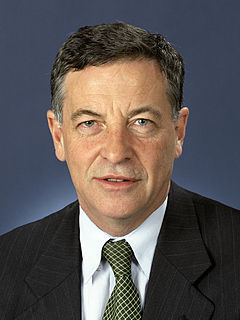
The Senate is the upper house of the bicameral Parliament of Australia, the lower house being the House of Representatives. The composition and powers of the Senate are established in Chapter I of the Constitution of Australia. There are a total of 76 senators: 12 are elected from each of the six Australian states regardless of population and 2 from each of the two autonomous internal Australian territories. Senators are popularly elected under the single transferable vote system of proportional representation.
Elections in Australia take place periodically to elect the legislature of the Commonwealth of Australia, as well as for each Australian state and territory and for local government councils. Elections in all jurisdictions follow similar principles, although there are minor variations between them. The elections for the Australian Parliament are held under the federal electoral system, which is uniform throughout the country, and the elections for state and territory Parliaments are held under the electoral system of each state and territory.
This is a list of members of the Australian Senate from 1990 to 1993. Half of the state senators had been allocated a long term following the double dissolution election in 1987 and had terms due to finish on 30 June 1993; the other half of the state senators were elected at the March 1990 election and had terms due to finish on 30 June 1996. The territory senators were elected at the March 1990 election and their terms ended at the next federal election, which was March 1993.
This is a list of members of the Australian Senate from 1985 to 1987. The number of senators was increased from ten to twelve senators for each of the six states of Australia. The representation of the Northern Territory and the Australian Capital Territory remained at two senators each. This would give a total of 76 senators in the Senate.

The 1987 Australian federal election was held in Australia on 11 July 1987, following the granting of a double dissolution on 5 June by the Governor-General Sir Ninian Stephen. Consequently, all 148 seats in the House of Representatives as well as all 76 seats in the Senate were up for election. The incumbent Australian Labor Party, led by Prime Minister Bob Hawke, defeated the opposition Liberal Party of Australia, led by John Howard and the National Party of Australia led by Ian Sinclair. This was the first, and to date only, time the Labor Party won a third consecutive election.
This is a list of members of the Australian Senate from 1975 to 1978. The 13 December 1975 election was a double dissolution of both houses, with all 127 seats in the House of Representatives, and all 64 seats in the Senate up for election. Malcolm Fraser had been commissioned as prime minister following the dismissal of Gough Whitlam's Labor government by Governor-General Sir John Kerr, on 11 November 1975. The same day, Fraser advised the calling of the election, in accordance with Kerr's stipulated conditions. Thus the Liberal Party of Australia, led by Fraser, with Coalition partner the National Country Party, led by Doug Anthony, went to the election as a caretaker government. The election resulted in the Coalition securing government with a 30-seat swing away from Labor in the House of Representatives.
This article provides information on candidates who stood for the 1951 Australian federal election. The election was held on 28 April 1951.
This article provides information on candidates who stood for the 1975 Australian federal election. The election was held on 13 December 1975.
This article provides information on candidates who stood for the 1983 Australian federal election. The election was held on 5 March 1983.
This article provides information on candidates who stood for the 1987 Australian federal election. The election was held on 11 July 1987.

The 2016 Australian federal election was a double dissolution election held on Saturday 2 July to elect all 226 members of the 45th Parliament of Australia, after an extended eight-week official campaign period. It was the first double dissolution election since the 1987 election and the first under a new voting system for the Senate that replaced group voting tickets with optional preferential voting.
Section 13 of the Constitution of Australia provides for three aspects of the terms of members of the Australian Senate: the timing of elections, the commencement date of their terms and for the Senate to allocate long (six-year) and short (three-year) terms following a double dissolution of the Parliament of Australia. While members of the House of Representatives and territory senators have a maximum three-year term, state senators have a fixed six-year term, subject only to the parliament being dissolved by a double dissolution.

This is a list of members of the Australian Senate following the 2016 Australian federal election held on 2 July 2016. The election was held as a consequence of a double dissolution in which both houses of parliament were dissolved. Ordinarily, only half of the senators terms end at each election. In this case, all 76 senators were elected. At the first sitting following the election, half of the senators representing each of the six states of Australia were allocated six-year terms to end on 30 June 2022, with the remainder allocated three-year terms to end on 30 June 2019. The terms of senators from the Australian Capital Territory and the Northern Territory end on the day of the next federal election.</ref>

The 2016 Australian federal election in the Senate was part of a double dissolution election held on Saturday 2 July to elect all 226 members of the 45th Parliament of Australia, after an extended eight-week official campaign period. It was the first double dissolution election since the 1987 election and the first under a new voting system for the Senate that replaced group voting tickets with optional preferential voting.

The following tables show state-by-state results in the Australian Senate at the 1996 federal election. Senators total 35 coalition, 29 Labor, two Green, two non-coalition National, seven Democrats, and one Independent. Senator terms are six years, and took their seats from 1 July 1996, except the territories who took their seats immediately.

The following tables show state-by-state results in the Australian Senate at the 1987 federal election. This election was a Double dissolution, which means that all 12 senators from each state were up for election. Senators total 29 coalition, 32 Labor, one Jo Vallentine Peace Group, four non-coalition National, seven Democrats, one Nuclear Disarmament and one Independent. Territory Senators served until the next federal election. State Senator terms were nominally three or six years, backdated from 1 July 1987. The Senate used the order-elected method to allocate three- and six-year seats, despite provisions for the AEC to conduct a special recount.

The Tasmanian Nationals are a political party in the Australian state of Tasmania, aligned with the National Party of Australia. The party is not currently registered with the Tasmanian Electoral Commission, and is not separately registered with the Australian Electoral Commission, unlike the other state branches of the Nationals.

The following tables show state-by-state results in the Australian Senate at the 1983 Australian federal election. Senators total 25 coalition, 30 Labor, three non-coalition National, five Democrats, and one Independent. Senate terms are six years. As the election was the result of a double dissolution, all 64 senate seats were vacant. All elected senators took their seats immediately with a backdated starting date of 1 July 1982, except for the territorial senators who took their seats at the election. Half of the senators elected in each state were allocated 3-year terms to restore the rotation.

The following tables show state-by-state results in the Australian Senate at the 1980 federal election. Senators total 31 coalition, 27 Labor, two non-coalition National, five Democrats, and one Independent. Senator terms are six years. Senators elected at this election began their terms on 1 July 1981, except for the territorial senators who took their seats at the election.
The 5 September 1914 election was a double dissolution election which meant all 36 seats in the Senate were up for election, with each Australian states electing six members, with half to serve a six-year term and the rest to serve a three year term. Terms were taken to have commenced on 1 July 1914. The Senate resolved that in each State the three senators who received the most votes would sit for a six-year term, finishing on 30 June 1920 while the other half would sit for a three-year term, finishing on 30 June 1917.












